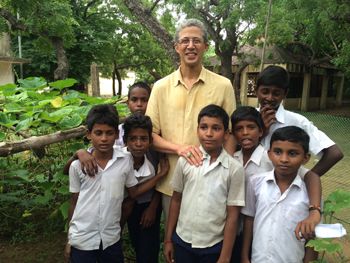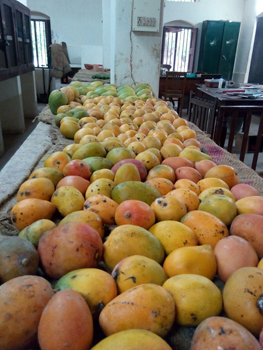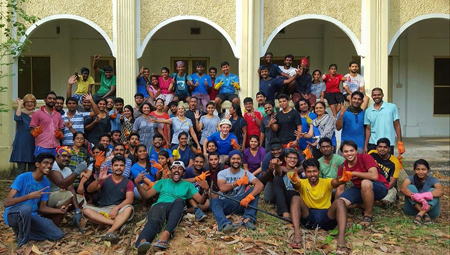Printed in the Fall 2016 issue of Quest magazine.
Citation: Boyd, Tim, "President’s Diary" Quest 104.4 (Fall 2016): pg. 96-97
After I returned from a series of conferences in Latin America in April , one of my first appointments was to speak at the Universalist Unitarian church near Olcott. Old friends and longtime TS members Pete and Lois Pedersen are members of the church, and every year invite me to address the congregation. It is an exceptional group of people, with no shared creed and with diverse faith and philosophical backgrounds, but who are united in their search for spiritual growth. It is an annual source of enjoyment for me, and apparently for the congregation. They keep inviting me back.
| Tim Boyd poses with seventh- level students at the Olcott Memorial High School |
During the month of April we had a visit from Deepa Padhi. Deepa and her Theosophical Order of Service (TOS) group in Odisha, India have been extremely active with educational efforts and with consciousness raising in regard to women’s issues. In September they are organizing a pan-Indian Theosophical educational conference. Representatives from twelve Theosophical and TOS schools throughout India will be gathering in Odisha for three days. Vic Hao Chin, past president of the TS in the Philippines and director of the TOS-founded Golden Link College, will be directing the meeting. Deepa was in town briefly and wanted to go over some of the thinking for the conference.
Love was in the air in April. During one week in April we had two wedding ceremonies on campus. The first was for Jason Morrow and Kenneth Schuett. Jason is assistant manager of our Quest Book Store. Although all weddings are special, our second ceremony was truly exceptional for a number of reasons. Several months earlier Miles Standish and Winnie Wylie had let me know that they would like to celebrate their marriage here at Olcott. Of course, I was all for it. I have known them both for years, and they had been longtime TS members. How long? Between the two of them, they had a combined membership of more than 140 years! They had known each other since their first meeting back in 1953 at a Theosophical camp in Michigan. Presently Miles is ninety, and his blushing bride is eighty-three. They asked me to perform the wedding. When they went to City Hall in Wheaton to get their marriage license, the head of the department came out personally to meet them. He told them that theirs was the first license that office had ever issued for a couple their age. They are an example of hope for all of us.
In May the Maryland branch of the TS celebrated its hundredth anniversary. The gathering was held at their lovely building in the historic downtown area of Baltimore. Janet Kerschner, our archivist, and I had been invited to address the meeting. Old and new members attended, along with a healthy contingent from nearby Washington, D.C. The meetings were chaired by the president of the group, Leonard Jackson. As you might expect, the lodge has a rich history and has been good about preserving photos and records showing their activities over the past century.
From Baltimore my wife, Lily, and I drove up the East Coast to New York to attend the forty-fifth reunion of my high school class. Ours was a small school, and except for a couple of classmates, this was the first time I was seeing them since graduating. I wasn’t sure what to expect, but I was pleasantly surprised that all were healthy and looking good. I was also pleasantly surprised at how many had followed my involvement with the TS, and how aware they were of its history and ideas. We closed the restaurant talking long into the night.
In May the Book Expo of America had its annual gathering in Chicago. It is a huge event that brings together publishers, authors, and everyone else involved in the book business. I was there to meet with Michael Kerber, president of Red Wheel Weiser, the global distributor for our Quest Books. A year ago we discontinued our release of new book titles. Since that time we have been allowing our restructuring to take effect and thinking about our new role. As of 2016, Quest Books has been in business for fifty years, so we have a very strong and valuable backlist of publications. With a return to financial sustainability, we have been rethinking the idea of releasing new books. Michael and I had a chance to talk about it.
| Adyar-grown mangoes |
Then it was off to Krotona in Ojai, California, for a series of meetings. Because of scheduling demands, I had not visited Krotona in a year and a half. As always, it was both refreshing and inspiring. After so many years of association, just to see so many old friends again is a good thing. Of course, nothing stays the same. This was my first visit since Joy Mills and Jon Parisen passed away. In the past, time spent with them had been one of the beautiful features of every trip. The president of the Australian Section, Linda Oliveira, conducted the meetings. Her husband, Pedro, assisted.
At the end of May we boarded the plane for Adyar. The big news from Adyar was that on May 17 the tensile membrane roof structure that had been constructed in time for our December 2015 convention collapsed. It was a major disappointment and, obviously, the first order of business on my arrival. Experts were summoned to determine the causes, which were due to design and execution flaws. Now the real work of redesign and proper reconstruction begins. We are fortunate that similar structures are becoming common throughout India. One of the foremost authorities on these structures, who is also a professor of engineering at the prestigious Indian Institute of Technology, has volunteered to do the design work and supervise the reconstruction. In theory the new structure will be in place well before the time for our next December-January convention . . . in theory.
As I may have pointed out in past Diaries, there are said to be three seasons in Chennai, India—hot, hotter, and hottest. The month of June marks a transition time from hottest to hotter. With daytime temperatures in the hundreds and nighttime temperatures in the upper eighties and nineties, this year was consistent. One lovely feature about June is that it is also the peak of mango season. There are more than 300 varieties of mango in India, and for years it had been a “bucket list” item for me to eat a mango picked fresh from a tree. For people who have only tasted the one or two varieties that make it to the U.S., you have no idea what you are missing. During the month at Adyar, I probably had ten different types, each with its own subtle and exquisite flavor—everything from the regal Alphonso mango (which fetches $12 apiece in Singapore!) to a drinking mango. You roll it in your hands, pull off the stem and, using the mango itself as the container, suck out the plentiful juice inside. We grow a number of varieties at our Adyar campus.
At our Adyar library and archives, we are continuing the digitization process that began a year ago. Our library is one of the foremost repositories in India for Tamil language palm leaf manuscripts. During Henry Steel Olcott’s life he amassed more than 18,000 of these handwritten texts, some of them more than 600 years old when he got them. As might be expected, time and insects are taking a toll.
| Chennai Trekkers river cleanup crew |
Over in the archives we are also putting special attention on digitizing HPB’s scrapbooks. In all there are thirty-two of them. They are a fascinating record of her interests, and include newspaper clippings on a variety of subjects, with drawings and even cartoons modified by her. With luck, we expect to have the initial scanning done in a couple of months, and we plan to have the computer color corrections necessary to make some of the aging pages readable finished before year-end. Then we can make them available to the world online.
The Adyar campus fronts the Adyar River and the Bay of Bengal. One result of the historic flooding in November and December of 2015 is that when the overflowing current of the river receded, it deposited tons of trash along the river’s length, especially at our end, where it emptied into the bay. As of this writing, for the past ten to twelve weeks a dedicated crew of sixty to 100 young people have been coming to the campus every Friday to gather, sort, recycle, and take away the tons of accumulated trash. Each week they focus on a stretch of riverbank. The work is the creation of Peter Van Geit, a seventeen-year resident of Chennai hailing originally from Belgium. His passion for trekking in nature attracted a group around him that became known as “The Chennai Trekkers.” Part of their focus is active restoration of the environment. An outgrowth of their work has been the largest cleanup effort of its type in all of India. Every year in June they have a massive cleanup of the Bay of Bengal beaches in Chennai. This year 5800 people came out for one day. We are blessed to have them in Chennai.
Tim Boyd




